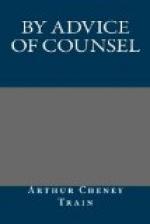Mr. Tutt smiled one of his genial weather-beaten smiles at the youngster and glancing idly over the bill of fare ordered biklama and coffee. Then he lit a stogy and stretched his long legs comfortably out under the narrow table. Yes, this was the very spot where either Sardi Babu and his friends had been sitting the night of the murder or Kasheed Hassoun and his friends—one or the other; he wondered if anybody would ever know which. Was it possible that in this humdrum little place human passions had been roused to the taking of life on account of some mere difference in religious dogma? Was this New York? Was it possible to Americanize these people? A door clattered in the rear, and from behind the screen again emerged the boy carrying a tray of pastry and coffee.
“Well, my little man,” said Mr. Tutt, “do you work here?”
“Oh, yes,” answered the embryonic citizen. “My father, he owns half the store. I go to school every day, but I work here afterward. I got a prize last week.”
“What sort of a prize?”
“I got the English prize.”
The lawyer took the child’s hand and pulled him over between his knees. He was an attractive lad, clean, responsive, frank, and his eyes looked straight into Mr. Tutt’s.
“Sonny,” he inquired his new friend, “are you an American?”
“Me? Sure! You bet I’m an American! The old folks—no! You couldn’t change ’em in fifty years. They’re just what they always were. They don’t want anything different. They think they’re in Syria yet. But me—say, what do you think? Of course I’m an American!”
“That’s right!” answered Mr. Tutt, offering him a piece of pastry. “And what is your name?”
“George Nasheen Assad,” answered the boy, showing a set of white teeth.
“Well, George,” continued the attorney, “what has become of Kasheed Hassoun?”
“Oh, he’s down at Coney Island. He runs a caravan. He has six camels. I go there sometimes and he lets me ride for nothing. I know who you are,” said the little Syrian confidently, as he took the cake. “You’re the great lawyer who defended Kasheed Hassoun.”
“That’s right. How did you know that, now?”
“I was to the trial.”
“Do you think he ought to have been let off?” asked Mr. Tutt whimsically.
“I don’t know,” returned the child. “I guess you did right not to call me as a witness.”
Mr. Tutt wrinkled his brows.
“Eh? What? You weren’t a witness, were you?”
“Of course I was!” laughed George. “I was here behind the screen. I saw the whole thing. I saw Kasheed Hassoun come in and speak to Sardi Babu, and I saw Sardi draw his revolver, and I saw Kasheed tear it out of his hand and strangle him.”
Mr. Tutt turned cold.
“You saw that?” he challenged.
“Sure.”
“How many other people were there in the restaurant?” inquired Mr. Tutt.




